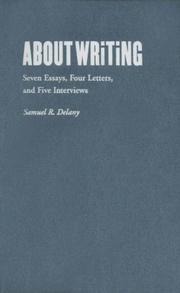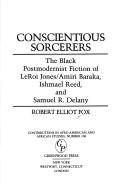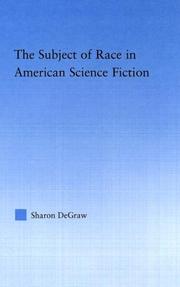| Listing 1 - 10 of 11 | << page >> |
Sort by
|
Book
ISBN: 081957693X 9780819576934 9780819570895 9780819576033 0819576034 9780819576026 0819570893 0819576026 Year: 2017 Publisher: Middletown, Connecticut
Abstract | Keywords | Export | Availability | Bookmark
 Loading...
Loading...Choose an application
- Reference Manager
- EndNote
- RefWorks (Direct export to RefWorks)
The private journals of renowned novelist and critic Samuel R. Delany.
Science fiction --- Authors, American --- Authorship. --- Delany, Samuel R.

ISBN: 0819562807 0819552763 1283110008 081957192X 9786613110008 0585371202 Year: 1994 Publisher: Hanover, NH Wesleyan University Press : University Press of New England
Abstract | Keywords | Export | Availability | Bookmark
 Loading...
Loading...Choose an application
- Reference Manager
- EndNote
- RefWorks (Direct export to RefWorks)
Authors [American ] --- 20th century --- Interviews --- Delany, Samuel Ray --- Science fiction --- Authorship --- Delany, Samuel R. - Interviews. --- Science fiction - Authorship. --- DELANY (SAMUEL R.) --- AMERICAN AUTHORS --- SCIENCE FICTION --- INTERVIEWS --- 20th CENTURY

ISBN: 0819574244 9780819574244 0819567159 9780819567154 0819567167 9780819567161 Year: 2005 Publisher: Middletown, CT Wesleyan University Press
Abstract | Keywords | Export | Availability | Bookmark
 Loading...
Loading...Choose an application
- Reference Manager
- EndNote
- RefWorks (Direct export to RefWorks)
Essential reading for the creative writer.
Authorship. --- Science fiction --- Authors, American --- Authoring (Authorship) --- Writing (Authorship) --- Literature --- Delany, Samuel R.
Book
ISBN: 1283128330 9786613128331 0819572462 9780819572462 9780819568830 081956883X 9781283128339 6613128333 9780819568847 0819568848 0819572942 Year: 2009 Publisher: Middletown, Conn. Wesleyan University Press
Abstract | Keywords | Export | Availability | Bookmark
 Loading...
Loading...Choose an application
- Reference Manager
- EndNote
- RefWorks (Direct export to RefWorks)
An indispensable work of science fiction criticism revised and expanded
Science fiction --- Science --- Science stories --- Fiction --- Future, The, in literature --- Technique. --- History and criticism. --- Delany, Samuel R.
Book
ISBN: 0819572942 9780819572943 9780819568847 0819568848 Year: 2012 Publisher: Middletown, CT Wesleyan University Press
Abstract | Keywords | Export | Availability | Bookmark
 Loading...
Loading...Choose an application
- Reference Manager
- EndNote
- RefWorks (Direct export to RefWorks)
The long-awaited reissue of a classic work of criticism - revised and expanded. In Starboard Wine, Samuel R. Delany explores the implications of his now-famous assertion that science fiction is not about the future. Rather, it uses the future as a means of talking about the present and its potentiality. By recognizing a text's specific "difference," we begin to see the quality of its particulars. Through riveting analyses of works by Joanna Russ, Robert Heinlein, Theodore Sturgeon, and Thomas M. Disch, Delany reveals critical strategies for reading that move beyond overwrought theorizing and formulaic thinking. Throughout, the author performs the kinds of careful inquiry and urgent speculation that he calls others to engage in.
Science fiction --- Science --- Science stories --- Fiction --- Future, The, in literature --- Technique. --- History and criticism. --- Delany, Samuel R.
Book
ISBN: 9781501355912 1501355910 1501355929 1501355937 1501355945 1501373161 Year: 2020 Publisher: New York, NY Bloomsbury Academic
Abstract | Keywords | Export | Availability | Bookmark
 Loading...
Loading...Choose an application
- Reference Manager
- EndNote
- RefWorks (Direct export to RefWorks)
"This book examines the literary strategies developed by Virigina Woolf, Samuel R. Delany, and J. M. Coetzee in response to sociopolitical crises of their times."--
Fiction --- Crises in literature --- Critical pedagogy --- Authorship --- Psychological aspects --- Social aspects --- Woolf, Virginia, --- Delany, Samuel R. --- Coetzee, J. M., --- Criticism and interpretation. --- Modernism (Literature)

ISBN: 0313250332 Year: 1987 Publisher: New York Greenwood Press
Abstract | Keywords | Export | Availability | Bookmark
 Loading...
Loading...Choose an application
- Reference Manager
- EndNote
- RefWorks (Direct export to RefWorks)
African Americans in literature --- African Americans --- American fiction --- Postmodernism (Literature) --- Intellectual life --- African American authors --- History and criticism --- Baraka, Amiri, --- Delany, Samuel R. --- Reed, Ishmael, --- Criticism and interpretation.
Book
ISBN: 3035399697 3035306109 3034307527 Year: 2014 Publisher: Bern, Switzerland : Peter Lang, International Academic Publishers,
Abstract | Keywords | Export | Availability | Bookmark
 Loading...
Loading...Choose an application
- Reference Manager
- EndNote
- RefWorks (Direct export to RefWorks)
Although published in 1986, Demand the Impossible was written from inside the oppositional political culture of the 1970's. Reading works by Joanna Russ, Ursula K. Le Guin, Marge Piercy, and Samuel R. Delany as indicative texts in the intertext of utopian science fiction, Tom Moylan originated the concept of the «critical utopia» as both a periodizing and conceptual tool for capturing the creative and critical capabilities of the utopian imagination and utopian agency. This Ralahine Classics edition includes the original text along with a new essay by Moylan (on Aldous Huxley's Island) and a...
Science fiction, American --- Utopias in literature. --- American fiction --- History and criticism. --- Russ, Joanna, --- Le Guin, Ursula K., --- Piercy, Marge, --- Delany, Samuel R., --- USA.

ISBN: 0819574546 9780819574541 0819563986 9780819563989 0819563994 9780819563996 Year: 2000 Publisher: Hanover
Abstract | Keywords | Export | Availability | Bookmark
 Loading...
Loading...Choose an application
- Reference Manager
- EndNote
- RefWorks (Direct export to RefWorks)
Selected by Choice as an Outstanding Academic Book of the Year. This innovative cultural critique offers valuable insights into science fiction, thus enlarging our understanding of critical theory.
Science fiction --- Science --- Science stories --- Fiction --- Future, The, in literature --- History and criticism --- Theory, etc. --- Lem, Stanisław. --- Russ, Joanna, --- Dick, Philip K. --- Le Guin, Ursula K., --- Delany, Samuel R. --- Science-fiction --- Histoire et critique --- Théorie, etc

ISBN: 0203944488 1135864586 0415979013 041580289X Year: 2007 Publisher: Taylor & Francis
Abstract | Keywords | Export | Availability | Bookmark
 Loading...
Loading...Choose an application
- Reference Manager
- EndNote
- RefWorks (Direct export to RefWorks)
While the connections between science fiction and race have largely been neglected by scholars, racial identity is a key element of the subjectivity constructed in American SF. In his Mars series, Edgar Rice Burroughs primarily supported essentialist constructions of racial identity, but also included a few elements of racial egalitarianism. Writing in the 1930s, George S. Schuyler revised Burroughs' normative SF triangle of white author, white audience, and white protagonist and promoted an individualistic, highly variable concept of race instead. While both Burroughs and Schuyler wrote SF focusing on racial identity, the largely separate genres of science fiction and African American literature prevented the similarities between the two authors from being adequately acknowledged and explored. Beginning in the 1960s, Samuel R. Delany more fully joined SF and African American literature. Delany expands on Schuyler's racial constructionist approach to identity, including gender and sexuality in addition to race. Critically intertwining the genres of SF and African American literature allows a critique of the racism in the science fiction and a more accurate and positive portrayal of the scientific connections in the African American literature. Connecting the popular fiction of Burroughs, the controversial career of Schuyler, and the postmodern texts of Delany illuminates a gradual change from a stable, essentialist construction of racial identity at the turn of the century to the variable, social construction of poststructuralist subjectivity today.
Science fiction, American --- Race in literature. --- Subjectivity in literature. --- History and criticism. --- Burroughs, Edgar Rice, --- Schuyler, George S. --- Delany, Samuel R. --- Criticism and interpretation. --- Schuyler, George Samuel, --- Berrouz, Edhar, --- ביראוס, אדגר רייס, --- バローズ, E. R., --- Берроуз, Едгар, --- Bërrouz, Ėdgar, --- Бёрроуз, Эдгар, --- edgar --- rice --- burroughs --- genre --- schuylers --- black --- community --- farnhams --- freehold --- star
| Listing 1 - 10 of 11 | << page >> |
Sort by
|

 Search
Search Feedback
Feedback About UniCat
About UniCat  Help
Help News
News